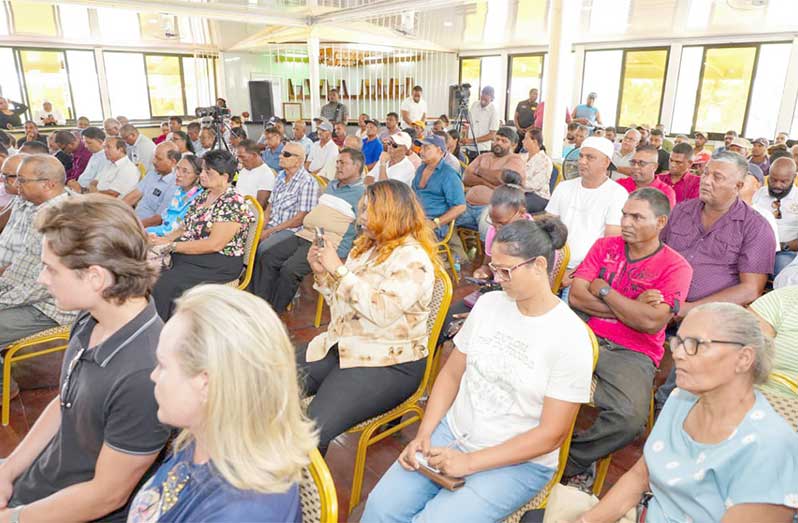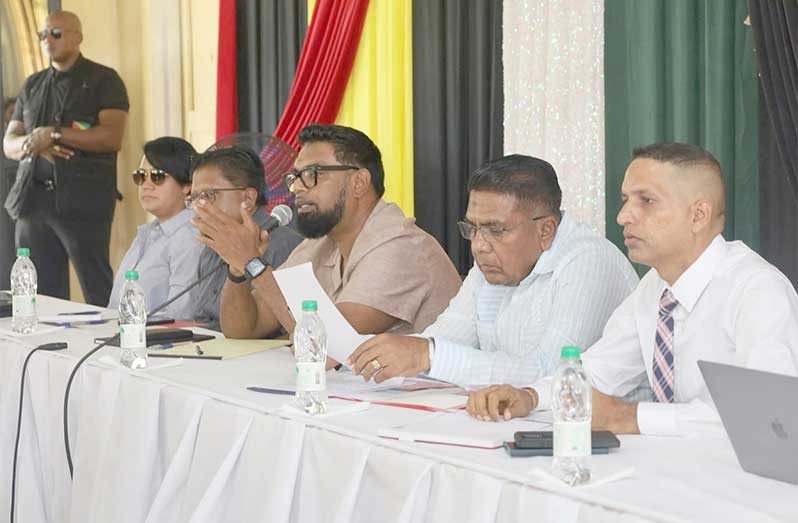– Skeldon farmers urged to embrace science-driven, market-oriented agriculture
By Bebi Shafeah Oosman
PRESIDENT Irfaan Ali has called on private cane farmers in the Skeldon, Upper Corentyne area to significantly ramp up agricultural production and fully utilise their land holdings as he cautioned that ongoing government investments in infrastructure must be matched by tangible increases in productivity.
Speaking directly to a gathering of farmers and GuySuCo officials on Wednesday, President Ali emphasised the importance of linking state support to results on the ground.
“We can’t have people holding on to land while the government is making heavy investments in drainage, irrigation, and infrastructure. All of this must be tied to production and productivity. That is how we expand business opportunities, create jobs, and grow the economy,” he said.
During his address, the President laid out an ambitious vision for a multi-crop agricultural model where traditional sugarcane cultivation can co-exist with high-value crops such as citrus. He said this transition would be guided by scientific planning, supported by modern technology, and driven by market needs.
“We want this to be science-driven, market-driven and profitable. Whatever we do must make sense in the long term,” the President stated.
To support this transformation, soil samples are expected to be collected in the coming days and sent for analysis to determine the most suitable crops for various sections of farmland. This data-driven approach will help farmers make informed decisions and increase their chances of success in a competitive market.
In addition, the government is developing a dedicated website to provide real-time access to critical data for the agriculture sector.
President Ali also disclosed that discussions are underway with investors from the Dominican Republic and Brazil’s Roraima State to facilitate knowledge exchange and introduce advanced agricultural technologies. These partnerships aim to enhance the technical capacity of local farmers and help them transition to more productive, modernised farming methods.
A significant opportunity on the horizon is the proposed establishment of a juice processing plant by Demerara Distillers Limited (DDL) in Skeldon. The President revealed that the facility could become operational within eight to twelve months, but emphasised that it depends on farmers’ commitment to cultivating citrus at scale.
Reiterating his government’s commitment to the sector, President Ali highlighted the state’s role in creating an enabling environment for agricultural success.
“Of course, sugar will remain an important aspect of our requirement and our agricultural product base. We are fully aware that the process of mechanisation and the process of system improvement, and also improvement in the field must continue at even more rapid pace for this sector to realise greater potential and move towards a more sustainable and manageable operation,” he explained.
He noted that private cane farmers control between 10,000 to 12,000 hectares of land and commended those who have already begun diversifying. He cited one farmer managing 400 acres of citrus as an example of the type of initiative that aligns with the government’s vision.
“I had some discussions and I’m very impressed with some of the farmers [and what they are already doing],” the President said.
Still, he cautioned that government investments including those in drainage, irrigation, and roads must be justified by increased production.
“We can’t have investments being made and a means of production, which is land, is being idle, then we are not maximising the use of the factors of production in building the economy, expanding business opportunities, and creating jobs.”
President Ali further said that once the scientific assessments are completed, a core group of farmers will work alongside the Ministry of Agriculture to chart a plan toward large-scale production. This plan will involve identifying key crops and beginning full-scale planting in selected areas within a year.
“We are doing everything scientifically… So we will be building up your website for this development, all of the innovation will be placed on the website so all the farmers can see it, investors can see it,” he said.
Looking ahead, President Ali stressed the need to tie any future agricultural expansion to existing market access and to work closely with investors who can help open new markets for locally produced crops.
“Whatever is done must be linked to markets, and we have to engage those who have access to the markets,” he concluded.



.jpg)








